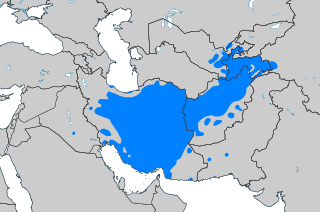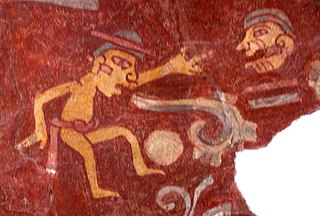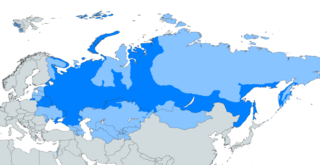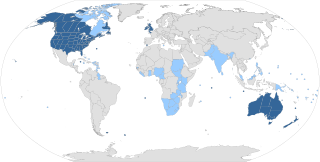
C is a general-purpose computer programming language. It was created in the 1970s by Dennis Ritchie, and remains very widely used and influential. By design, C's features cleanly reflect the capabilities of the targeted CPUs. It has found lasting use in operating systems, device drivers, protocol stacks, though decreasingly for application software. C is commonly used on computer architectures that range from the largest supercomputers to the smallest microcontrollers and embedded systems.

French is a Romance language of the Indo-European family. It descended from the Vulgar Latin of the Roman Empire, as did all Romance languages. French evolved from Gallo-Romance, the Latin spoken in Gaul, and more specifically in Northern Gaul. Its closest relatives are the other langues d'oïl—languages historically spoken in northern France and in southern Belgium, which French (Francien) largely supplanted. French was also influenced by native Celtic languages of Northern Roman Gaul like Gallia Belgica and by the (Germanic) Frankish language of the post-Roman Frankish invaders. Today, owing to France's past overseas expansion, there are numerous French-based creole languages, most notably Haitian Creole. A French-speaking person or nation may be referred to as Francophone in both English and French.

Persian, also known by its endonym Farsi, is a Western Iranian language belonging to the Iranian branch of the Indo-Iranian subdivision of the Indo-European languages. Persian is a pluricentric language predominantly spoken and used officially within Iran, Afghanistan, and Tajikistan in three mutually intelligible standard varieties, namely Iranian Persian, Dari Persian and Tajiki Persian. It is also spoken natively in the Tajik variety by a significant population within Uzbekistan, and Dehwari and Madaklashti varieties of Persian are spoken in Pakistan, as well as within other regions with a Persianate history in the cultural sphere of Greater Iran. It is written officially within Iran and Afghanistan in the Persian alphabet, a derivation of the Arabic script, and within Tajikistan in the Tajik alphabet, a derivation of the Cyrillic script.

German is a West Germanic language mainly spoken in Central Europe. It is the most widely spoken and official or co-official language in Germany, Austria, Switzerland, Liechtenstein, and the Italian province of South Tyrol. It is also a co-official language of Luxembourg and Belgium, as well as a recognized national language in Namibia. Outside Germany, it is also spoken by German communities in France (Bas-Rhin), Czech Republic, Poland, Slovakia, and Hungary (Sopron).

Hindi, or more precisely Modern Standard Hindi, is an Indo-Aryan language spoken chiefly in the Hindi Belt region encompassing parts of northern, central, eastern, and western India. Hindi has been described as a standardised and Sanskritised register of the Hindustani language, which itself is based primarily on the Khariboli dialect of Delhi and neighbouring areas of North India. Hindi, written in the Devanagari script, is one of the two official languages of the Government of India, along with English. It is an official language in nine states and three union territories and an additional official language in three other states. Hindi is also one of the 22 scheduled languages of the Republic of India.
Japanese is spoken as a native language by about 128 million people, primarily Japanese people and primarily in Japan, the only country where it is the national language. Japanese belongs to the Japonic or Japanese-Ryukyuan language family. There have been many attempts to group the Japonic languages with other families such as the Ainu, Austroasiatic, Koreanic, and the now-discredited Altaic, but none of these proposals has gained widespread acceptance.

Language is a structured system of communication. The structure of a language is its grammar and the free components are its vocabulary. Languages are the primary means by which humans communicate, and may be conveyed through a variety of methods, including spoken, sign, and written language. Many languages, including the most widely-spoken ones, have writing systems that enable sounds or signs to be recorded for later reactivation. Human language is highly variable between cultures and across time. Human languages have the properties of productivity and displacement, and rely on social convention and learning.

Latin is a classical language belonging to the Italic branch of the Indo-European languages. Latin was originally a dialect spoken in the lower Tiber area around present-day Rome, but through the power of the Roman Republic it became the dominant language in the Italian region and subsequently throughout the Roman Empire. Even after the fall of Western Rome, Latin remained the common language of international communication, science, scholarship and academia in Europe until well into the 18th century, when other regional vernaculars supplanted it in common academic and political usage, and it eventually became a dead language in the modern linguistic definition.

Russian is an East Slavic language mainly spoken in Russia. It is the native language of the Russians, and belongs to the Indo-European language family. It is one of four living East Slavic languages, and is also a part of the larger Balto-Slavic languages. Besides Russia itself, Russian is an official language in Belarus, Kazakhstan, and Kyrgyzstan, and is used widely as a lingua franca throughout Ukraine, the Caucasus, Central Asia, and to some extent in the Baltic states. It was the de facto language of the former Soviet Union, and continues to be used in public life with varying proficiency in all of the post-Soviet states.

The Chapacuran languages are a nearly extinct Native American language family of South America. Almost all Chapacuran languages are extinct, and the four that are extant are moribund. They are spoken in Rondônia in the southern Amazon Basin of Brazil and in northern Bolivia.

Multilingualism is the use of more than one language, either by an individual speaker or by a group of speakers. It is believed that multilingual speakers outnumber monolingual speakers in the world's population. More than half of all Europeans claim to speak at least one language other than their mother tongue; but many read and write in one language. Multilingualism is advantageous for people wanting to participate in trade, globalization and cultural openness. Owing to the ease of access to information facilitated by the Internet, individuals' exposure to multiple languages has become increasingly possible. People who speak several languages are also called polyglots.

Google Translate is a multilingual neural machine translation service developed by Google to translate text, documents and websites from one language into another. It offers a website interface, a mobile app for Android and iOS, and an API that helps developers build browser extensions and software applications. As of January 2023, Google Translate supports 133 languages at various levels, and as of April 2016, claimed over 500 million total users, with more than 100 billion words translated daily, after the company stated in May 2013 that it served over 200 million people daily.

English is a West Germanic language of the Indo-European language family, with its earliest forms spoken by the inhabitants of early medieval England. It is named after the Angles, one of the ancient Germanic peoples that migrated to the island of Great Britain. Existing on a dialect continuum with Scots, and then most closely related to the Low German and Frisian languages, English is genealogically West Germanic. However, its vocabulary also shows major influences from French and Latin, plus some grammar and a small amount of core vocabulary influenced by Old Norse. Speakers of English are called Anglophones.

All Rebel Rockers is the sixth studio album by Michael Franti & Spearhead released on September 9, 2008, on Boo Boo Wax and ANTI- Records. It peaked at number 37 on the U.S. Billboard 200, making it their most successful album.
The Urhobos are people located in southern Nigeria, near the northwestern Niger Delta.

Tinsel is a Nigerian soap opera that began airing in August 2008. On 23 May 2013, the show's 1000th episode aired. It has been called "the most successful television drama on Nigerian television in recent times". On 21 Jan 2021, the show's 3000th episode aired.

Takuji Ichikawa is a Japanese novelist. Ichikawa's bestsellers include Ima ai ni yukimasu (2003), Ren'ai shashin (2003) and Sono Toki wa Kare ni Yoroshiku (2004).
Chase is a 2019 American action thriller film directed and written by Michael Matteo Rossi. The film stars Damien Puckler, Aries Spears, Richard Riehle, Oghenekaro Itene, Jessica Morris, Simeon Panda, Rob Niter and Skye Townsend.

The Jesuit Missions of Moxos are located in the Llanos de Moxos of Beni department in eastern Bolivia. Distinguished by a unique fusion of European and Amerindian cultural influences, the missions were founded as reductions or reducciones de indios by Jesuits in the 17th and 18th centuries to convert local tribes to Christianity.
















